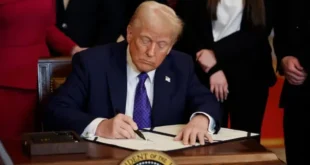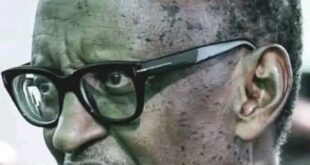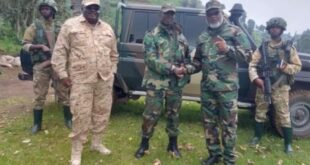By: CommandonePost
A coalition of about 37 Rwandan organizations operating from abroad has written to the H.E. Amb. Smail Chergui, the Commissioner of Peace and Security, African Union (AU) to help and intervene in addressing deteriorating cases of human rights abuses and security in Rwanda.
In a copy of the letter which this website has obtained, Rwandan organizations say people back home continue to face allegations of human rights violations that are of an extremely serious nature.
“These allegations have been found credible by none less than Human Rights Watch, Amnesty International and UN panel on human rights. Several well-grounded allegations exist about the extreme lack of fundamental freedoms in Rwanda, which it is charged, has resulted in serious violations of freedom of expression, association and movement, as well as entrenched impunity and serious human rights violations. Together, these make Rwanda the most acute human rights abuser within the Great Lakes region” Letter reads in part.
It adds that “Your excellency, we draw your attention to grave human rights violations in Rwanda that have been internationally recognized and reports of ongoing human rights violations that are regularly highlighted. Despite Rwanda’s repeated denial, these serious and persistent violations have been widely documented by Human Rights bodies for the past 26 years. They also led to a UN Human Rights Council resolution on the country earlier this year”.
The UN High Commissioner for Human Rights has always named Rwanda among the top 10 countries in the world that have gone unpunished for intimidation and reprisals against critics.
“Your Excellency, in 1994, Rwanda suffered a tragedy that left over one million of its citizens dead as a result of war and genocide. The war and genocide resulted in immense suffering to millions more. The war and genocide have had far-reaching repercussions for both Rwanda and the Great Lakes region of Central Africa as a whole”.
They say President Kagame is perceived by most outsiders as both invincible and indispensable to national and regional stability adding that there is however, more to Rwanda and Paul Kagame than new buildings, clean streets, and efficient government than President Kagame’s famous friends in high places in Europe and America care to admit.
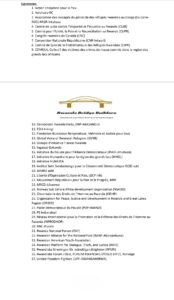
“Rwanda is essentially a hard – line, one-party, secretive police state with a façade of democracy. The ruling party, the Rwandese Patriotic Front (RPF), has closed space for political participation. The RPF does not tolerate political opposition or open competition for power. The government ensures its monopoly of power by means of draconian restrictions on the exercise of the fundamental human rights of citizens. The press, civil society and opposition parties are deprived of freedom to operate freely.”
They also revealed that President Kagame and the ruling party that he leads have always depended on repression to stay in power.
“State institutions, especially law enforcement agencies, the judiciary and security services, serve to protect the RPF’s, and ultimately Kagame’s power monopoly instead of protecting the fundamental human rights of citizens. Repression has again become particularly acute in recent months”.
There have been assassination attempts, killings and enforced disappearances of members of the press and political opposition within and outside Rwanda. Purges of political enemies, real and imagined, within the ruling party government continue unabated. These purges have now been extended to the military.
“A climate of fear and terror has enveloped the nation. Rwanda is in crisis. The situation that prevails raises serious questions about the country’s future. Current Political status Rwanda is a one-party dictatorship under President Kagame”.
They accuse President Kagame of effectively corrupting the founding ideals of the RPF which he uses to deny the people of Rwanda the opportunity to exercise their fundamental human rights, particularly the right of political participation.
“President Kagame is both corrupt and authoritarian. He uses repression to ensure his continued monopoly of power. State institutions violate the most fundamental human rights of the people, including the right to life and the integrity of the person, to keep the President Kagame in power”.
They further explain that Rwanda’s state security institutions enjoy impunity for grave human rights violations against critics and opponents of the government.
“President Kagame’s abuse of the institutions of the state to support his quest for absolute power and economic gain is criminalizing the fabric of the Rwandan state. Judicial system you’re Excellency, in Rwanda, the functioning of the justice system is constrained by lack of judicial independence. The judiciary does not enjoy independence. The independence of Rwanda’s judiciary is compromised by the executive. The President, through the control that he exercises over the Senate Chamber of the legislature, controls most senior judges (including the Supreme Court) and through them, the rest of the judiciary”.
“Most of the members of the judiciary are cadres of the ruling party, Rwanda Patriotic Front (RPF). The RPF compels its members who have been appointed to the judiciary to continue to owe allegiance to the party; to participate in some activities of the party and to pay financial contributions to the party’s campaign and daily operation.”
“Judicial authorities operate in a political context where the executive continues to dominate the judiciary and where there is an official antipathy to views diverging from those of the government and the dominant party, the Rwandan Patriotic Front (RPF)”.
“The judiciary is particularly vulnerable to outside interference in cases involving political issues. The President, his close advisers and security services personnel frequently coerce members of the judiciary to make judicial decisions to suit the interests of the regime”.
“Instead of being the protector and defender of citizens’ fundamental human rights, the judiciary has become one of the main tools by which the regime perpetuates authoritarian rule by persecuting opponents and critics”.
Persecution of Political Opponents.
They say the regime in Rwanda has for years jailed political opponents and disqualified them from running for office. Since the ruling Rwandan Patriotic Front took power, Rwandans have faced huge, and often deadly, obstacles to participating in public life and voicing criticism of government policies.
“Killings and disappearances need to be placed in the context of many years of similar violence for which no one has yet been held to account. In this chilling atmosphere, it is unsurprising that would-be government critics practice self-censorship”.
“The regime uses the coercive instruments of the state that is the military, security services and police, to sustain the status quo in power against the will of the people. State security officers continue to commit grave human rights abuses to suppress all political opposition and critics of government. Impunity for gross human rights abuses is worse than it was prior to the genocide. Rwanda remains deeply divided along ethnic lines”.
As a result of these and other factors, Rwanda remains unstable and prone to violent, and identity-based conflict. The report documents how opposition politicians, journalists and human rights defenders have faced restrictions on their rights to freedom of expression, association and peaceful assembly in the two decades since the genocide.
“They have been jailed, physically attacked – even killed – and forced into exile or silence. Independent human rights defenders who criticize government policies or are perceived as opponents to government have faced different forms of attacks and restrictions in Rwanda”.
“NGOs are subject to onerous – and costly – registration procedures. The nebulous charge of promoting ‘genocide ideology’ has been levied at international and domestic human rights organizations who criticize the government”.
“Rwanda’s history of political repression, attacks on opposition figures and dissenting voices in the context of previous elections, stifles political debate and makes those who might speak out think twice before taking the risk. People accused of crimes against state security continued to be arrested and held unlawfully in military camps”.
“Many people held in these camps were tortured in an attempt to force them to confess or accuse others. Authorities continued to round up street vendors, sex workers, street children, and other poor people and detained them in so-called transit centers across the country. Conditions in these centers are harsh and inhumane, and beatings are common”.
“For years, thousands of men, women, and children—many of them street children, commercial sex workers, or street hawkers are detained unlawfully, without charge or trial, in very poor conditions in an unrecognized detention centre commonly known as Kwa Kabuga, in the Gikondo area of Kigali. Many were beaten by police or by other detainees in the presence of police”.
“Rwanda has degenerated into a criminal state. Victims of human rights violations committed against persons considered to be opponents of the government do not have an opportunity for seeking redress from the courts. Agents of the state are, to this day, still able to commit grave human rights abuses that is killings, torture, and disappearances, without fear of being held accountable. Impunity for human rights violations is now far more deeply entrenched in the Country, Rwanda”.
Reconciliation
“The promotion of national reconciliation should have been the foremost priority of Rwandan society in the aftermath of the genocide.
Instead, President Kagame’s pursuit of absolute power, his intolerance for political opposition, persecution of opponents and critics of the regime and partisan nature of the processes of accountability for past human rights violations that Rwanda has undertaken, have all led to elusiveness of national unity and reconciliation”.
“As a result of the policies that the regime has pursued since it took control of government, Rwandan society remains deeply divided”.
The politics of ethnicity remain intractable in Rwanda.
Armed insurgents continue to wage war against the Rwandan state from their sanctuaries in the Democratic Republic of Congo, twenty-six years after the genocide.
Externally – based unarmed opposition has on several occasions called for dialogue on how to resolve Rwanda’s continuing crisis, but the regime has refused to heed to that call of negotiating with its opponents.
The Kagame led regime has failed to engage and lead Rwandan society in genuine reconciliation. The social conditions of post -genocide Rwanda remain constructed in terms of ethnic identity.
“ The reconciliation that the Rwanda regime envisions is politically constructed on the terms of the ruling party – RPF and President Kagame, which are insufficient for ensuring the long-term stability of Rwanda. Lack of national dialogue on reconciliation processes has very profound implications for the long -term stability of Rwanda and the security of its population”.
“There cannot be genuine reconciliation in Rwanda until the grievances of both Tutsis and Hutus communities are well and genuinely discussed”.
“Your Excellency, Rwanda is a member state of the AU, and it is expected to uphold the human rights principles set out in AU’s Constitutive Act. Your Excellency, the on-going violations of human rights in Rwanda are not in keeping with the country’s obligations and domestic laws, including the constitution and major international and regional human rights instruments ratified by Rwanda”.
“Paul Kagame and his regime violate objectives 3(g) and (h) of the Constitutive Act of the AU which enjoins AU member States to promote popular participation and human and people’s rights, respectively”.
“Recalling the role of the AU as the lead regional institution tasked to better the lives of the people of Africa, and particular Rwandan citizens as in this case, we respectfully ask you to take measures to ensure that the regime of president Paul Kagame restores respect for the rule of law, ensures ample protection of human rights and aligns its practices to ratified international and regional human rights standards including the Constitutive Act of the AU and the African Charter on Human and Peoples’ Rights”.
“We respectfully ask you to consider including the situation of human rights in Rwanda as a point for discussion in the agenda of the next Summit of the Assembly of Heads of State and Government of the AU with recommendations for the Summit to deliberate on asking the government of Rwanda”.
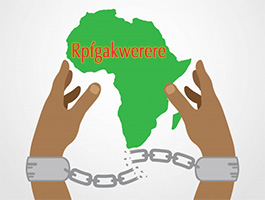 Africa Just another WordPress site
Africa Just another WordPress site
